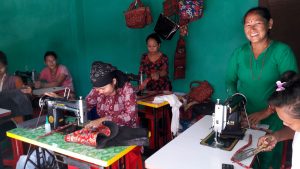 SUS’s past record in livelihoods interventions, this strategic plan also proposes that SUS continue to work in this area. SUS integrates the livelihood component into most of its development programme/project, as the rural households with whom it works include the resource-poor. Viewed from this perspective, improving their livelihood becomes an important action for SUS to help them move out of poverty. SUS experience has shown that the integration of livelihood component provides low-income households with an opportunity to earn living through their genuine participation in farm or non-farm economic activities in a sustainable way. SUS organizes and mobilizes communities for generating financial capital and social networking. It promotes low cost, climate-resilient, and market-oriented farm productions, and facilitates the target groups for small and micro enterprises development. It initiatives to promote coordination and partnership with local stakeholders for market linkage and economic infrastructures helps bring multiplier effects.
SUS’s past record in livelihoods interventions, this strategic plan also proposes that SUS continue to work in this area. SUS integrates the livelihood component into most of its development programme/project, as the rural households with whom it works include the resource-poor. Viewed from this perspective, improving their livelihood becomes an important action for SUS to help them move out of poverty. SUS experience has shown that the integration of livelihood component provides low-income households with an opportunity to earn living through their genuine participation in farm or non-farm economic activities in a sustainable way. SUS organizes and mobilizes communities for generating financial capital and social networking. It promotes low cost, climate-resilient, and market-oriented farm productions, and facilitates the target groups for small and micro enterprises development. It initiatives to promote coordination and partnership with local stakeholders for market linkage and economic infrastructures helps bring multiplier effects.
Program Areas
Livelihood for a resilient community
Education, Health and WASH for equitable human development
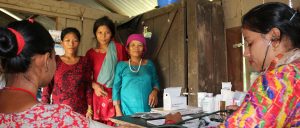 SUS believes that investment in education and health is important for human capital which impacts positively on the income of a person and his/her family, and the improved education and health help families escape from some of the vicious circle of poverty in which they are trapped. SUS integrates education and health interventions and implements in the same families as these two are closely related to each other. Water, sanitation, and hygiene (WASH) is also an embedded issue for a better return on health as well as education, and therefore, the WASH initiatives of SUS complements education and health-related results. SUS seeks to empower its target communities through the implementation of educational activities. SUS engages and motivates parents for their children’s education, provide scholarships to needy children/youths for achieving quality education and vocational training, and collaborates with schools and local governments for implementing educational rights of targeted children. In order to increase access to health, it supports and works for improving community health and nutrition, and communities’ access to safe drinking water. The awareness-raising and community mobilization for sanitation and hygiene promote tangible changes in the communities.
SUS believes that investment in education and health is important for human capital which impacts positively on the income of a person and his/her family, and the improved education and health help families escape from some of the vicious circle of poverty in which they are trapped. SUS integrates education and health interventions and implements in the same families as these two are closely related to each other. Water, sanitation, and hygiene (WASH) is also an embedded issue for a better return on health as well as education, and therefore, the WASH initiatives of SUS complements education and health-related results. SUS seeks to empower its target communities through the implementation of educational activities. SUS engages and motivates parents for their children’s education, provide scholarships to needy children/youths for achieving quality education and vocational training, and collaborates with schools and local governments for implementing educational rights of targeted children. In order to increase access to health, it supports and works for improving community health and nutrition, and communities’ access to safe drinking water. The awareness-raising and community mobilization for sanitation and hygiene promote tangible changes in the communities.
Awareness and advocacy for inclusive governance and social justice
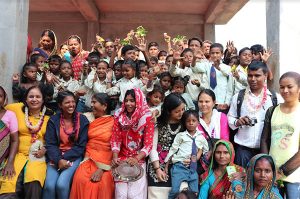 SUS was established to works for the equality, justice, rights, and development of discriminated and marginalized people like Dalit, women, landless squatters and minority groups. Therefore, it particularly advocates to end discrimination based on caste and gender, enhance access to land and citizenship certificate, promote social justice and ensure effective participation of right holders in governance. SUS advocacy strategies aim to empower rights holders to claim their rights, and actually use their power to effectively participate in decision-making processes at all levels. It raises mass awareness against bad social norms and practices, and foster respect for social diversity. SUS capacity building initiatives impart advocacy knowledge and skills to local leaders and activists and enable enforcement agencies to work together fighting against social problems. SUS emphasizes evidence-based advocacy. It invests in issue-based knowledge production and disseminates knowledge to wider actors internally and externally. The efforts for alliance building and collaboration with stakeholders build solidity and accumulate power to influence policy and decisions. SUS also supports the struggle of rights holders and facilitates their advocacy for inclusive policies and equitable access to public services and justice.
SUS was established to works for the equality, justice, rights, and development of discriminated and marginalized people like Dalit, women, landless squatters and minority groups. Therefore, it particularly advocates to end discrimination based on caste and gender, enhance access to land and citizenship certificate, promote social justice and ensure effective participation of right holders in governance. SUS advocacy strategies aim to empower rights holders to claim their rights, and actually use their power to effectively participate in decision-making processes at all levels. It raises mass awareness against bad social norms and practices, and foster respect for social diversity. SUS capacity building initiatives impart advocacy knowledge and skills to local leaders and activists and enable enforcement agencies to work together fighting against social problems. SUS emphasizes evidence-based advocacy. It invests in issue-based knowledge production and disseminates knowledge to wider actors internally and externally. The efforts for alliance building and collaboration with stakeholders build solidity and accumulate power to influence policy and decisions. SUS also supports the struggle of rights holders and facilitates their advocacy for inclusive policies and equitable access to public services and justice.
Disaster Risk Reduction and Climate Change Adaptation
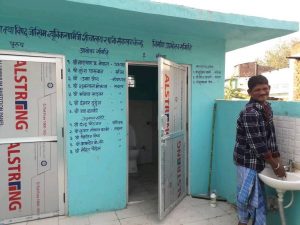 Nepal is exposed to multiple geophysical and hydro-meteorological hazards. Climate change threatens to increase the risks of disasters and negate the chances of sustainable development. The people suffer from water-induced disasters such as flood, and reoccurrence of devastating havocs (e.g., outbreak of fire and diseases in rural communities) in the plain areas of the country. Therefore, SUS has been working on the issues of disaster risk reduction and climate change adaptation. SUS supports for mobilizing the vulnerable communities to cope with such situations, as well as preparing them, through awareness-raising and developing their capabilities to manage and cope with potential disaster in the future. It also raises awareness about the risks associated with climate change at the local level. Besides, under extreme cases, it also directly provides short-term relief and rehabilitation support to the needy disaster victims.
Nepal is exposed to multiple geophysical and hydro-meteorological hazards. Climate change threatens to increase the risks of disasters and negate the chances of sustainable development. The people suffer from water-induced disasters such as flood, and reoccurrence of devastating havocs (e.g., outbreak of fire and diseases in rural communities) in the plain areas of the country. Therefore, SUS has been working on the issues of disaster risk reduction and climate change adaptation. SUS supports for mobilizing the vulnerable communities to cope with such situations, as well as preparing them, through awareness-raising and developing their capabilities to manage and cope with potential disaster in the future. It also raises awareness about the risks associated with climate change at the local level. Besides, under extreme cases, it also directly provides short-term relief and rehabilitation support to the needy disaster victims.
Institutional Development
In order to thrive undertaking development interventions and be more suitable for the organization role, SUS gives priority for its own institutional development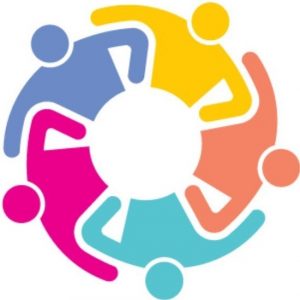 . Institutional development is an on-going process and must be continued. The SWOT analysis of the organization (See Annex-1) directs that there are still areas in which SUS has to be strengthened. Therefore, SUS works for standardized operation and accountable governance of the organization. It takes measures to improve organization’s management system, and strengthen programme/service delivery of the organization. Human resource (both board and staff) development is a key priority. SUS gives due efforts to develop organizational capacity for fundraising and utilization and extends external relations and networking. In addition, SUS facilitates the process for formation/strengthening of organizations and institutions of its target beneficiary communities by themselves.
. Institutional development is an on-going process and must be continued. The SWOT analysis of the organization (See Annex-1) directs that there are still areas in which SUS has to be strengthened. Therefore, SUS works for standardized operation and accountable governance of the organization. It takes measures to improve organization’s management system, and strengthen programme/service delivery of the organization. Human resource (both board and staff) development is a key priority. SUS gives due efforts to develop organizational capacity for fundraising and utilization and extends external relations and networking. In addition, SUS facilitates the process for formation/strengthening of organizations and institutions of its target beneficiary communities by themselves.

